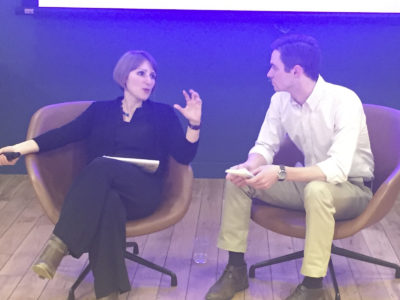
Sarah Beaulieu and Kelley O’Brien sat across from each other in WeWork’s Cambridge office, fully prepared to have an uncomfortable conversation — one they agreed many offices avoid — about sexual assault and harassment.
The conversation was part of an event called “Sexual Assault & Consent: Tough Conversations, Challenging Coverage,” examining how workplace assault and harassment are reported, held on Wednesday by Civic Series.
Following a TEDx talk she gave in 2016, Sarah Beaulieu created The Uncomfortable Conversation, a nonprofit dedicated to “normalizing conversations about sexual violence.” Her main goal is to educate men about their role in the dialogue on sexual assault and consent.
“Men need to part of this conversation,” Beaulieu said in an interview with The Daily Free Press. “And I think men need some help and support imagining what masculinity could look like if we want to live in a gender society that’s gender inclusive.”
To begin the conversation, Beaulieu questioned O’Brien, a reporter for the Boston Business Journal who focuses on assault in the tech-world, about his work with sexual assault survivors.
O’Brien said he never really thought about sexual assault until his college girlfriend shared her story with him.
“I didn’t understand how an evil thing like this could happen,” he said.
O’Brien began writing about sexual assault, focusing on the workplace, when a survivor of assault came to him with her story. When writing the story, O’Brien said, he met the survivor on her terms and let her set guidelines, which included their first conversation being off the record.
There is a legal obligation of the person writing the story to protect the survivor, Beaulieu said.
In the conversation’s second half, O’Brien asked Beaulieu about her role at The Uncomfortable Conversation and how she helps survivors.
“There’s this public feeling that that to feel solidarity with this movement you have to for example, tweet something. Well, you don’t.” Beaulieu said. “You don’t have to martyr yourself for the sake of a public conversation.”
Beaulieu recounted her own experience of sharing the story of her assault with a reporter from Romper, an online parenting website. Beaulieu remembered hating the article, how the reporter phrased her story and wishing, in a way, that she’d never shared the story.
“There’s an emotional cost for survivors that journalists need to take into account,” she said.
Since the news cycle is so hectic, O’Brien said, accusations of sexual assault tend to be swept aside.
“One thing that reporters or the media is not usually particularly good at … is long-term focus on a topic,” O’Brien said in an interview with The Daily Free Press.
Last summer, O’Brien said, news broke about venture capitalists harassing female employees. The news was all over every station for about a month, with everyone in the Boston area making a statement — and then flamed it out, and hasn’t really been brought up since.
“Nothing had changed structurally,” he said. “So, any issue that existed previously still exists, and any power balance that existed in this behavior still exists, because all we did was talk about it for a month.”
Media outlets should be asking companies every few months about the assault charges, O’Brien said, to keep the stories of the survivors alive and to try and bring about real change.
Miranda Aisling, 24, of Arlington, said it was interesting to attend an event on sexual assault where “a man [spoke] for over half the time,” but she appreciated the dialogue around helping survivors.
“Thinking about how many survivors are probably sitting in the room right now,” she said, “and what it means to be given direct paths to be able to follow and what questions to ask is very helpful.”
People should strive, Beaulieu said, to confront conversations that make them uncomfortable.
“I think none of us are immune to abusing power and privilege, whether it’s in the case of gender or race or class or other ability or disability,” Beaulieu said. “So I think getting comfortable about talking about these uncomfortable things is something we’ve all benefit from.”




















































































































